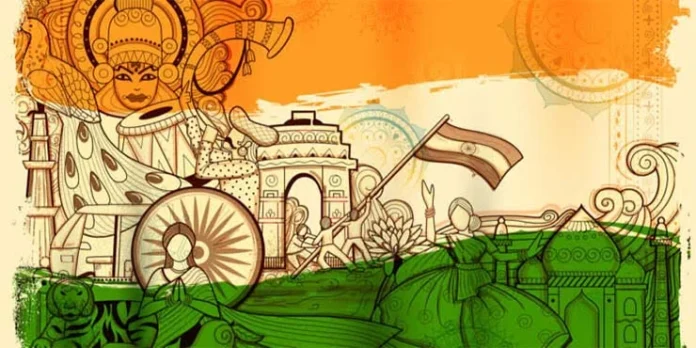The colonial period was truly a dark age in the history of Bharat. It not only ravaged the once proud civilisation of India but also undermined our resolve, confidence, capabilities and ideas of how to run one’s society.
The colonial period did not really begin with the British conquering India, but commenced with the arrival of the first Europeans – the Portuguese – on our soil for the first time in the 16th century.
However, in the fight for India, the British toppled every other European power and emerged as the victorious foreign power in India. What followed over the next two hundred years was the enslavement and colonisation of not just India’s economy and polity but also its psyche, ethics and mentality.
Fast forward to the present day, India is the lodestar in the global geopolitical landscape; it is the fifth largest economy in the world, an IT superpower, the first country to land its spacecraft on the south side of the moon, it is also the world’s fastest-growing economy among the G20 countries.
Therefore, at such a moment in history, it is necessary to highlight the concepts of mental colonisation & decolonisation.
Mental colonisation
Colonisation is the process of subjugating the indigenous sources of knowledge, institutions and cultures. In the case of European-cum-British colonisation, it involved undermining and destroying Indic sources of knowledge, ideas and institutions and replacing them with European ones.
Colonisation operates surreptitiously, it enslaves the mind of other people where the white man conquers another country and deliberately sends the message to the neurological system of the brain through overt and covert actions to show the people classified as the ‘other’ that what they called ‘civilisation’ was but an illusion, says Steven Pinker
The process is a psychological phenomenon that was explained brilliantly by Steven Pinker in his book The Blank Slate-The Modern Denial of Human Nature. Dr Pinker argues that colonisation operates surreptitiously, it enslaves the mind of other peoples where the white man conquers another country and deliberately sends the message to the neurological system of the brain through overt and covert actions to show the people classified as the ‘other’ that what they called ‘civilisation’ was but an illusion.
Mental colonisation involves various facets – it begins with an individual becoming sceptical of one’s own indigenous history, science, philosophy etc. The next thing that happens is the acceptance of the colonial narrative that the colonisation is for their own benefit and that white man has come to liberate them. The last stage involves totally supplanting the native psyche and replacing it with the colonial psyche. This was evident from the assertion by Thomas Babington Macaulay that the civil service would be the bulwark of British rule in India against rising Indian nationalism.
Decolonisation
It is the process of removing the remnants of colonisation from the indigenous psyche. This has been brilliantly captured in advocate J Sai Deepak’s book India, That is Bharat-Coloniality, Civilization and Constitution. Decolonisation has a number of processes – removing the belief from the native mind that the foreign civilisation, in India’s case, the British civilisation is infallible. Secondly, regaining the belief in the greatness of a country’s past achievements, history, philosophy and knowledge system, thirdly, undertaking an intellectual counterattack against the colonial narrative that deliberately berates one’s native culture, beliefs, ideas and institutions.
Decolonisation of the mind isn’t easy; it is a slow process with only incremental changes. As far as the Indian mind is concerned, the first step was the uprooting of British rule and establishing our country’s most important social contract – The Constitution of India.
Today, we are standing on the cusp of history.
India’s G20 presidency is a true reminder of the fact that the process of decolonisation has started and is gaining strong momentum. In that context, India’s correspondence with other countries where the Prime Minister and President are referred to as the heads of government and state, respectively, with the name of our country being Bharat is a sight to behold.
It is a moment of reckoning that India will no longer remain a mute spectator when it comes to her painful past, decolonisation is the need of the hour and shall continue till we haven’t fully decolonised our psyche and have elevated Bharat to the position of the global Vishwaguru who leads the world to spiritual greatness.
–The writer is currently working as a Research Associate at Defence Research and Studies (dras.in) and is a columnist. The views expressed are personal and do not necessarily reflect the views of Raksha Anirveda














